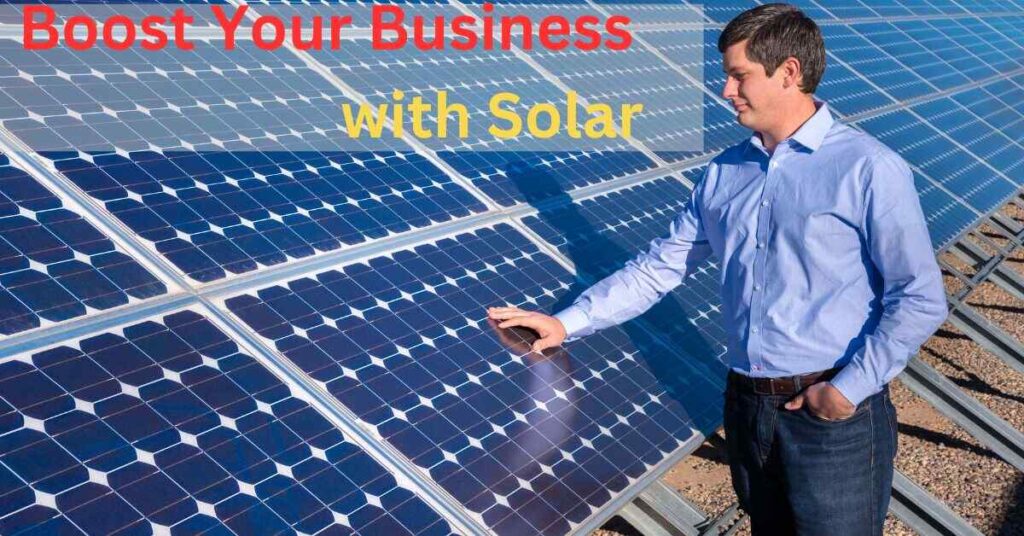As electricity expenses keep to upward thrust, savvy business owners are turning to solar power as a smart investment. Not only does it reduce your carbon footprint, but it can also knowingly lower your utility bills and even earn you tax motivations. In this complete guide, we’ll explore the advantages of going solar for your commercial property and provide expert tips on choosing the right installers, financing options, and system workings. Boost Your Business with Solar: Expert Tips on Choosing Installers and Financing.
Why Install Solar Panels on Your Commercial Property?
Going sun gives many benefits for companies, making it a practical choice for those seeking to reduce fees, growth profits, and include sustainability. Here are some gripping reasons to take into account sun:
- Reduced power prices: By harnessing the electricity of the sun, you may significantly reduce your reliance on traditional energy assets, resulting in substantial savings on your month-to-month energy bills. Many groups record recouping their initial funding in solar in only a few years via these financial savings.
- Improved environmental footprint: Switching to renewable energy sources like solar proves your commitment to sustainability, enhancing your brand’s standing and appealing to eco-conscious customers. As more consumers order supporting environmentally responsible businesses, going solar can give you a good edge.
- Tax incentives and rebates: Both federal and country governments provide various incentives, inclusive of tax credits and rebates, to inspire organizations to adopt solar electricity. These motivations can offset a big portion of the preliminary setup charges, making solar a more low-priced funding. For instance, the federal solar tax credit score currently lets agencies deduct 26% of the value of their solar system from their taxes.
- Elevated assets fee: residences with solar panel structures are frequently valued better than the ones without, imparting a capable return on investment if deciding to sell your worthwhile actual property inside the destiny. in keeping with a have a look at using the Lawrence Berkeley National Laboratory, houses with solar panels sell for around 4% greater than comparable houses without sun.
The Sizes of Commercial Solar Panel Setups
Commercial solar panel systems come in a range of sizes to accommodate different energy needs and property sizes. Here’s a breakdown of the common system sizes:
Less Than 30KW
Small to medium-sized businesses with modest energy requirements may find systems under 30KW suitable. These setups typically involve installing solar panels on the roof or in a designated area on the property. Examples of businesses that might benefit from a system in this range include:
- Small retail stores
- Restaurants
- Medical offices
- Small warehouses
30-100KW
Many small office buildings, retail stores, and restaurants often require systems within the 30-100KW range. These mid-sized installations can cover a significant portion of the business’s energy needs, leading to substantial cost savings. Some examples of businesses that might require a system in this range include:
- Large retail stores or shopping plazas
- Multi-tenant office buildings
- Hotels or motels
- Manufacturing facilities
100+ Watts
For larger commercial properties like manufacturing facilities, warehouses, or shopping malls, systems exceeding 100KW are necessary to meet substantial energy demands and achieve maximum cost savings. Businesses that might require a system of this size include:
- Large manufacturing plants
- Distribution centers
- Shopping malls
- Hospitals or medical campuses
250+ Watts
At the high end, installations of 250KW or more are designed for businesses with extremely high energy usage, such as data centers or large industrial complexes. These large-scale systems can potentially generate enough solar power to meet the entire energy needs of the facility. Examples of businesses that might require a system of this magnitude include:
- Data centers
- Large industrial plants
- University campuses
- Major sports arenas or stadiums
How Do You Connect Your Large-Scale Commercial Solar to the Grid?

Once you’ve installed a solar panel system, it’s important to connect it to the local utility grid. This process involves several steps:
- Obtaining vital allows and approvals: Before connecting your sun system to the grid, you’ll want to obtain the essential permits and approvals from the neighborhood government to ensure compliance with regulations. This normally entails filing plans and specifications for your system and having it checked by way of a licensed professional.
- Establishing a net metering settlement: Most utility vendors provide net metering packages, which will let you sell excess electricity generated using your solar device lower back to the grid. This now not most effective offsets your power fees however can probably earn you credit or bills from the application enterprise. Working with your provider to establish an internet metering agreement is a critical step in maximizing the monetary advantages of your Sun investment.
- Hiring a professional electrician: While some smaller residential systems may be self-hooked up, it’s particularly elective to rent an expert electrician to safely and well-tune your commercial sun system to the grid. A certified electrician will make sure that the relationship is made efficaciously and in agreement with all applicable codes and guidelines, ensuring a one-piece and reliable energy float.
| Read More About: Expert Tips on Choosing Installers and Financing |
How Much Does a Commercial Solar Install Cost?

The cost of an industrial sun installation can vary notably depending on elements like system size, gadget exceptional, labor charges in your region, and any additional infrastructure required. On average, small-scale systems under 30KW may cost between $10,000 and $50,000, while large-scale setups can range from $100,000 to millions of dollars for massive industrial complexes.
Here’s a rough breakdown of typical costs for different system sizes:
- Less than 30KW: $10,000 – $50,000
- 30-100KW: $50,000 – $250,000
- 100-500KW: $250,000 – $1 million
- 500KW – 1MW: $1 million – $3 million
- Over 1MW: $3 million+
It’s important to note that these are just estimates, and the actual cost of your solar installation may vary based on your specific circumstances and location. but, those figures can come up with a preferred concept of the funding required for exceptional system sizes. Boost Your Business with Solar: Expert Tips on Choosing Installers and Financing.
How Much of That Money Will I Get Back?
While the upfront costs of a commercial solar installation can be substantial, the good news is that a significant portion of that investment can be recouped through various incentives and rebate programs, as well as long-term energy savings.
What About Rebates?
Both federal and state governments offer a range of rebate programs to encourage businesses to adopt solar energy. These rebates can significantly offset the initial installation costs, making solar a more attractive investment. Boost Your Business with Solar: Expert Tips on Choosing Installers and Financing.
Small-Scale Technology Certificates (STCs)
For systems under 100KW, businesses can earn Small-Scale Technology Certificates (STCs), which are tradable certificates representing the renewable energy generated. that certificate may be offered to recoup a part of the installation costs.
The number of STCs earned is based on the amount of renewable energy your system is expected to generate over its lifetime, as well as the location of the installation. For example, a 30KW system in Los Angeles, California might earn around 170 STCs, which could potentially be sold for over $10,000 in rebates.
States Offering Solar Rebates
In addition to federal incentives, many states offer their rebate programs for commercial solar installations. The rebate amounts and eligibility requirements range based on system length, location, and other elements.
For instance, the New York State Energy Research and Development Authority (NYSERDA) gives rebates of up to $1 million for industrial and industrial sun initiatives, at the same time as the California Solar Initiative (CSI) software affords rebates for structures up to 1MW in size.
it’s crucial to research the particular rebate packages available to your kingdom to maximize your capacity for financial savings.
LGCs for Large-Scale Installations
For larger systems over 100KW, businesses can earn Large-Scale Generation Certificates (LGCs), which function similarly to STCs but are target at utility-scale solar projects. The number of LGCs earned is base on the amount of renewable energy generate, and these certificates can be sold to help offset the costs of the installation.
Monitoring and Maintaining Your Large-Scale Solar System
Once your solar system is installed and connect to the grid, it’s essential to monitor its performance and conduct regular maintenance to ensure optimal energy production and maximize your return on investment.
maximum official solar installers offer tracking answers that will let you tune your system’s strength manufacturing, overall performance, and any capacity troubles in actual time. this will assist you pick out and cope with any issues fast, minimizing downtime and lost energy technology.
Regular maintenance, such as cleaning panels, checking wiring and connections, and inspecting inverters, is also crucial for ensuring your system operates at peak efficiency. Many installers provide upkeep offerings as a part of their applications or as an extra provider.
Which Type of Panel Installation Works Best for Your Business?
The type of solar panel installation you choose depends on factors like your property’s layout, energy needs, budget, and local climate conditions. Some popular options include:
Roof-mounted structures: perfect for organizations with ample roof area and minimal shading from bushes or nearby buildings. Roof-set-up systems are often the maximum powerful option, as they don’t require additional land or infrastructure. Boost Your Business with Solar: Expert Tips on Choosing Installers and Financing.
FAQs
Ans: Look for installers that are certified by organizations like Solar Rating & Certification Corporation (SRCC). Get recommendations from other local businesses that have installed solar. Ask for multiple quotes and check credibility.
Ans: Popular options include loans, leases, and Power Purchase Agreements (PPA). Loans require upfront capital but you own the system. Leases have low/no upfront costs but you rent the panels. PPA you pay for the power generated at a fixed rate without owning the panels.
Ans: Return on investment timelines vary depending on system size, electricity rates, and incentives. Most small-medium business systems see a payback period of 5-10 years as you save on electricity costs. Larger installations may take longer.
Ans: Yes, solar can provide energy cost savings even for small spaces. Incentives also make the upfront costs more viable. Talk to installers to get an estimated production and payback period for your business needs.






